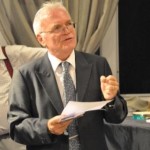weAnochi A’far waEfer – I am (merely) dust and ashes
When Abraham learns of the Divine intention to wipe out the entire wicked city of Sodom, he entreats before the Supreme Judge to save the city even for the sake of a small minority of righteous people in it. This back and forth verbal exchange sounds almost like a market bargaining, in which Abraham gradually goes down from his suggesting that there are 50 righteous to only ten righteous people in the city. In this debate between a human and God Abraham employs the phrase “weAnochi a’far waEfer – I am (merely) dust and ashes” [Gen. 18:27] as an expression of humility. A similar phrase is employed in Job 42:6
The two Hebrew words of this phrase form an alliteration since both share the consonants F and R, and begin with the two guttural consonants, aleph and a’yin. ‘Afar is the dust or soil from which God created the first human being, and Efer is the ashes that remain after a human body (or any organic matter) is consumed by fire, i.e. dust and ashes remind of the trodden upon, worthless substances of the origin and the final end of human beings… at least in the mind of our Biblical ancestors…
Only this consciousness of the human lowly, almost worthless, origin and end, allows a person like Abraham to courageously demand of God to apply justice when judging fellow human beings. Indeed we begin as dust and we end up as ashes, but in-between we represent God in this earthly material world. We are the only creature that is created in God’s image, and each of us may consider himself/herself as the first human God created, look around and declare: “For my sake the world was created!” [Mishna, Sanhedrin 4,5]
The balance between these two extremes, humility and pride, trembling in awe and confidently facing the Almighty, is our expectation of every human being! According to R. Simcha Bunem of Przysuch (pronounced by his disciples: Pshis-cha) each man should carry two notes in two pockets: One of them bearing the quote “For my sake the world was created!”and the other: “I am (merely) dust and ashes”
These two quotes remind me not only of the need to balance humility and pride, but also the need to balance ‘the Written Torah’ with ‘the Oral Torah’, i.e. The unchanging, eternal nucleus of our tradition with the flexible and ever-changing elements of our tradition. Only the combination of these two ensures that our Torah will always be ‘Torat Chayim’ –a living law, a Law of Life’. Our Torah is frequently portrayed as ‘Etz Chaim’ –a tree firmly striking roots in the earth while constantly growing and spreading leafy branches in all directions…
Rabbi Gil Nativ



















Leave a Reply